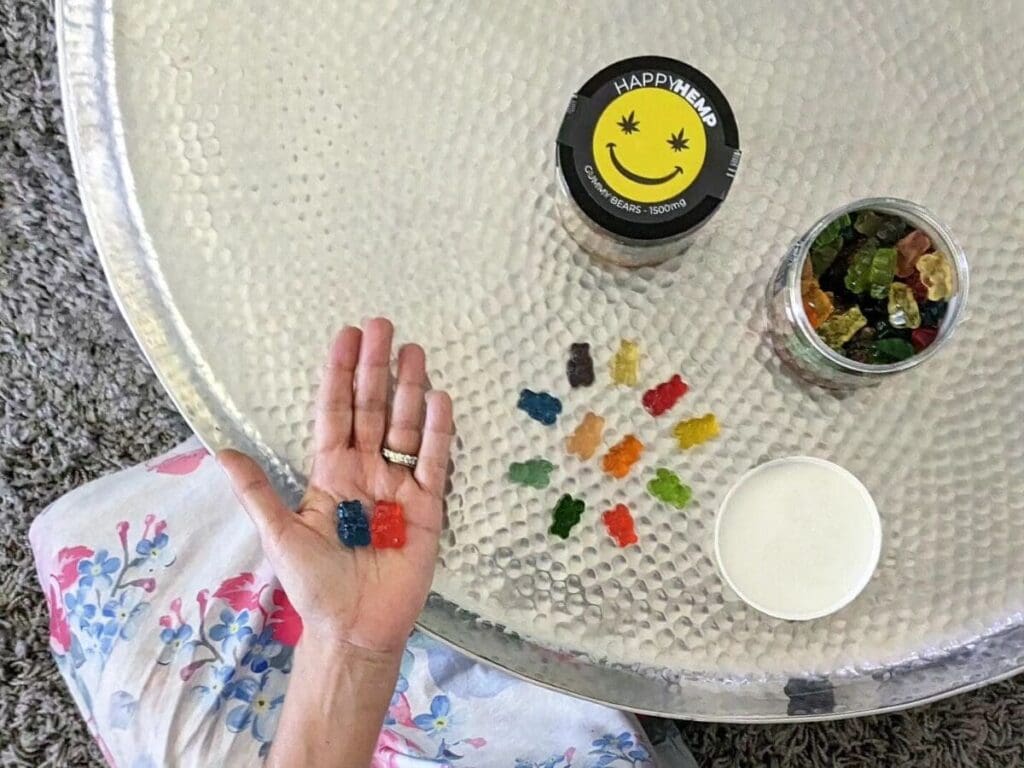Key Takeaways:
- CBD Duration: CBD typically stays in your system for 2 to 5 days, but this can vary based on individual factors like dosage and metabolism.
- Testing for CBD: Standard drug tests usually don’t detect CBD, but THC trace amounts in some products could potentially show up in tests.
- Reducing CBD Presence: Staying hydrated, exercising, and allowing time can help shorten the duration CBD remains in your system.
With years of experience in the industry, Happy Hemp understands the importance of transparency and education when it comes to using CBD effectively. That’s why we commit to providing reliable information on topics such as the duration of CBD in your system.
As interest in natural wellness continues to grow, more and more people are turning to CBD, or cannabidiol, as a potential remedy for various health concerns. Whether you’re using CBD for pain relief, anxiety, sleep, or general well-being, understanding how it interacts with your body is crucial. One common question many users have is: How long does CBD stay in your system?
Knowing the duration CBD remains in your body can be important for several reasons, whether you’re concerned about drug tests, curious about how it affects your system, or simply want to better understand how this popular compound works. In this article, we’ll explore the key factors that influence how long CBD stays in your system, the average duration, and how you can manage it effectively.
CBD: What It Is
CBD, short for cannabidiol, is a naturally occurring compound found in the cannabis plant. Unlike its more famous cousin, THC (tetrahydrocannabinol), CBD is non-psychoactive, meaning it doesn’t produce the “high” commonly associated with marijuana use. This has made CBD a popular choice for those seeking the potential health benefits of cannabis without the mind-altering effects.
CBD is extracted from hemp, a variety of cannabis that contains low levels of THC. It’s available in various forms, including oils, capsules, edibles, and topical creams, each offering different methods of delivery and absorption into the body. People use CBD for a wide range of reasons, including managing pain, reducing anxiety, improving sleep, and supporting overall wellness
While research into CBD’s full range of effects is still ongoing, many users report positive outcomes, leading to its increasing popularity. Understanding what CBD is and how it may benefit you is the first step in determining how it interacts with your body and how long it stays in your system.
Happy Hemp’s CBD Gummies are a perfect way to experience these benefits in a tasty and convenient form. Incorporate them into your daily routine for a natural approach to wellness. Try them today and feel the difference!
How CBD Interacts With Your Body
CBD interacts with your body through the endocannabinoid system (ECS), a complex cell-signaling system that plays a crucial role in maintaining homeostasis—your body’s internal balance. The ECS is involved in regulating a variety of functions, including mood, sleep, appetite, immune response, and pain.
When you consume CBD, it doesn’t directly bind to the cannabinoid receptors (CB1 and CB2) in your ECS as THC does. Instead, CBD influences these receptors in more indirect ways. It’s believed to enhance the ECS’s ability to maintain balance by preventing the breakdown of your body’s own endocannabinoids, which are the natural chemicals that interact with these receptors.
CBD also interacts with other receptors in your body, such as serotonin receptors, which play a role in mood and anxiety regulation, and TRPV1 receptors, which are involved in pain perception. This broad interaction with various receptors helps explain why CBD is associated with such a wide range of potential health benefits.
The way CBD interacts with your body is also a key factor in how long it stays in your system, as this interaction can vary depending on your body’s metabolism, the form of CBD used, and the dosage taken.
Factors That Affect How Long CBD Stays In Your System
The duration CBD stays in your system can vary significantly from person to person, influenced by several key factors. Understanding these factors can help you better estimate how long CBD might remain detectable in your body.
Dosage And Frequency of Use
The amount of CBD you consume and how often you use it are major determinants of how long it stays in your system. Higher doses and more frequent use can lead to a longer duration of CBD presence in the body. Regular use can also cause CBD to build up in your system over time, which means it could take longer to be fully eliminated.
Method Of Consumption
CBD can be consumed in various forms, including oils, edibles, capsules, and topicals. Each method of consumption affects how quickly CBD enters your bloodstream and how long it stays there. For instance, inhaling CBD (through vaping or smoking) allows it to enter the bloodstream rapidly, but it also tends to leave the system faster. On the other hand, CBD edibles or capsules take longer to be absorbed but remain in your system for a longer period.
Metabolism
Your metabolic rate plays a crucial role in how quickly your body processes and eliminates CBD. Individuals with faster metabolisms tend to process CBD more quickly, which can reduce the amount of time it stays in their system. Factors such as age, physical activity, and overall health can influence your metabolism.

Body Composition
Your body composition, including factors like body fat percentage, can impact how long CBD remains in your system. CBD is lipophilic, meaning it is attracted to and stored in fat cells. If you have a higher body fat percentage, CBD might be stored in your fat tissues and released more slowly over time, prolonging its presence in your body.
Other Medications And Supplements
If you are taking other medications or supplements, they can influence how your body processes CBD. Some medications may increase the time it takes for CBD to be metabolized, while others might speed up the process. It’s always a good idea to consult with a healthcare provider about potential interactions if you are on other medications.
Typical Duration Of CBD In Your System
The duration that CBD remains in your system can vary, but general estimates can help provide a baseline understanding. Typically, CBD can stay in your system for anywhere from 2 to 5 days. However, this range can be influenced by the factors we discussed earlier, such as dosage, method of consumption, and individual metabolism.
Short-Term Use
For those who use CBD occasionally or in small doses, CBD is likely to be eliminated from the body relatively quickly, usually within 2 to 3 days. This shorter duration is because the body can process and eliminate smaller amounts of CBD more efficiently, especially when it’s not stored in fat cells over a long period. Fast-acting methods of consumption, such as vaping or sublingual tinctures, also contribute to quicker absorption and elimination since they bypass the digestive system and liver, entering the bloodstream directly.
Regular Use
If you use CBD regularly or in higher doses, it can accumulate in your body over time. In these cases, CBD might stay in your system for up to a week or more. The more frequently you use CBD, the longer it may take for your body to completely eliminate it.
Long-Term Or High-Dose Use
For individuals who have been using CBD consistently over a long period, or who take particularly high doses, CBD may linger in the system for much longer, potentially up to two weeks or more after the last dose. This is because higher doses lead to more significant storage of CBD in fat cells, which then release the compound gradually. Additionally, the body may take longer to metabolize and clear large amounts of CBD, especially if the user has developed a tolerance, leading to prolonged detection times.
Elimination Half-Life
The elimination half-life of CBD, which is the time it takes for the concentration of CBD in the body to decrease by half, is generally estimated to be between 18 to 32 hours. This means that after this period, the amount of CBD in your system will be reduced by half, and it will continue to decrease at this rate until it is fully eliminated. The half-life can vary depending on individual factors such as metabolism, age, and liver function, which all play a role in how quickly or slowly CBD is broken down and excreted from the body.
How To Test For CBD In Your System
Testing for CBD in your system is not as common as testing for THC, the psychoactive compound in cannabis. However, it’s important to understand how CBD might be detected and under what circumstances testing might occur.
Standard Drug Tests And CBD
Most standard drug tests, such as urine tests, are designed to detect THC and its metabolites, not CBD. This means that if you are only using CBD products that contain no THC, it’s unlikely that a drug test will detect CBD in your system. However, some CBD products do contain trace amounts of THC (usually less than 0.3%), which could potentially show up on a drug test, especially with regular use.
Specific CBD Testing
While rare, there are specialized tests that can detect the presence of CBD in your system. These tests are typically used in scientific research or in certain legal situations where it is important to determine the presence of CBD. These tests can be conducted using blood, saliva, urine, or hair samples, with each method having different detection windows.
Urine Tests: Although rare for CBD, urine tests can detect CBD for up to 3 days after use, depending on the frequency and dosage.
Blood Tests: Blood tests are less common for CBD detection, as CBD is quickly eliminated from the bloodstream. Typically, CBD is only detectable in the blood for a few hours after use.
Saliva Tests: Saliva tests for CBD are also uncommon, but when used, they can detect CBD for up to 36 hours after consumption.
Hair Tests: Hair tests have the longest detection window and can potentially detect CBD for up to three months after use. However, this method is rarely used due to its cost and the difficulty of distinguishing CBD from other cannabinoids.
Implications For Drug Testing
If you are concerned about drug testing and are using CBD products, it’s important to choose products that are labeled as THC-free or that contain only trace amounts of THC (0.3% or less). Additionally, you may opt for products with third-party lab results verifying their THC content to avoid any potential issues.
How To Shorten The Time CBD Stays In Your System
If you’re looking to reduce the amount of time CBD stays in your system, there are several strategies you can consider. While there’s no guaranteed way to speed up the elimination process, certain practices may help your body metabolize and excrete CBD more efficiently.
- Stay Hydrated: Drinking plenty of water can help flush CBD and its metabolites out of your system more quickly. Staying hydrated supports your kidneys in filtering and excreting waste products through urine, which may help reduce the time CBD stays in your body.
- Increase Physical Activity: Engaging in regular physical exercise can boost your metabolism, potentially helping your body process CBD more quickly. Since CBD is stored in fat cells, burning fat through exercise might also help release and eliminate CBD from your system. However, this effect can vary depending on your body composition and exercise habits.
- Eat a Fiber-Rich Diet: A diet high in fiber can aid in the excretion of CBD through your digestive system. Fiber helps promote regular bowel movements, which can assist in eliminating CBD and other waste products from your body.
- Consider Detoxification Products: Some people use detox products that claim to help cleanse the body of various substances, including CBD. However, the effectiveness of these products can vary, and it’s important to choose detox products carefully, as some may contain ingredients that could cause side effects.
- Allow Time: The most reliable method for eliminating CBD from your system is simply to allow time for your body to naturally metabolize and excrete it. As discussed earlier, the duration CBD remains in your system depends on various factors, but allowing for sufficient time is key.
- Reduce or Pause CBD Use: If you’re concerned about how long CBD stays in your system, consider reducing your dosage or taking a break from using CBD. This will allow your body to gradually eliminate any remaining CBD, reducing the overall concentration in your system.
While these methods may help, it’s important to remember that the rate at which CBD is eliminated from your system can vary depending on individual factors such as metabolism, body composition, and overall health. Consulting with a healthcare provider is always recommended if you have any concerns, especially related to drug testing or medical conditions.

Final Thoughts
Understanding how long CBD stays in your system is essential for making informed decisions about its use, especially if you have concerns about drug testing or want to optimize the timing of your doses for maximum effectiveness. While CBD typically remains in your system for 2 to 5 days, this duration can vary based on factors such as your metabolism, body composition, dosage, and frequency of use.
By considering these factors, you can better predict how long CBD will be detectable in your body and take steps to manage its presence if necessary. Whether you’re using CBD for pain relief, anxiety, sleep, or general wellness, knowing how it interacts with your system empowers you to use it more effectively.
If you’re ever in doubt about how CBD might affect you or how long it will stay in your system, consulting with a healthcare professional can provide personalized guidance tailored to your specific needs and circumstances.
Read also:
- Boost Your Energy Naturally With CBD Gummies
- Dreaming Of Better Sleep? CBD Gummies Could Be Your Answer
- Are CBD Gummies The Answer To Joint Pain?
Frequently Asked Questions About CBD And Its Duration In The Body
Does CBD show up on a drug test?
Generally, CBD does not show up on a drug test. However, some CBD products contain trace amounts of THC, which can be detected in drug tests.
How long does it take for CBD to kick in?
The effects of CBD can be felt within 15 minutes when inhaled, but may take 30 minutes to 2 hours when consumed orally.
How long do the effects of CBD last?
The effects of CBD typically last between 2 to 6 hours, depending on the method of consumption and individual metabolism.
Can secondhand CBD use cause it to stay in your system?
Secondhand exposure to CBD, such as from vapor or smoke, is unlikely to cause significant amounts of CBD to stay in your system.
Does CBD build up in your system over time?
Yes, with regular use, CBD can accumulate in your system, potentially leading to longer detection times.
Can medications affect how long CBD stays in your system?
Yes, certain medications can either speed up or slow down the metabolism of CBD, altering how long it stays in your system.
How does age affect how long CBD stays in your system?
Older individuals may metabolize CBD more slowly, potentially causing it to stay in the system longer than in younger individuals.
Does the time of day you take CBD affect how long it stays in your system?
Taking CBD at night or on an empty stomach might affect how quickly it is metabolized and eliminated from your body.
Sources:
- Lucas, C. J., Galettis, P., & Schneider, J. (2018). The pharmacokinetics and the pharmacodynamics of cannabinoids. British journal of clinical pharmacology, 84(11), 2477-2482.
- Kraemer, M., Broecker, S., Madea, B., & Hess, C. (2019). Decarbonylation: A metabolic pathway of cannabidiol in humans. Drug Testing and Analysis, 11(7), 957-967.
- Child, R. B., & Tallon, M. J. (2022). Cannabidiol (CBD) dosing: Plasma pharmacokinetics and effects on accumulation in skeletal muscle, liver and adipose tissue. Nutrients, 14(10), 2101.







